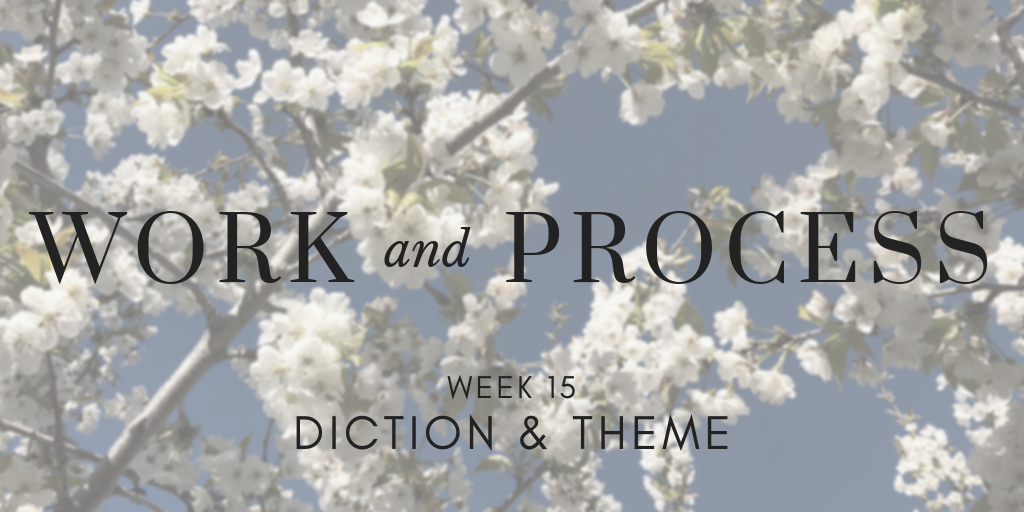|
It’s funny, I knew as soon as I started writing my first post on diction that I eventually wanted to talk about how diction affects theme. But over the past few weeks, as I’ve discussed and pondered and discussed diction and character and diction, atmosphere, and tension, in the back of my mind I’ve always been struggling with how to approach diction and theme. How do I talk about this? What books or poems or themes could I discuss? Why can’t I remember for the life of me one single theme that’s evoked with word choice? I guess it’s because theme (what I used to describe to my students as “what a piece of art has to say about a topic”) is so huge, usually spanning an entire novel instead of just one easily isolated excerpt, and also, personally, unless I’m really specifically trying to pull out a theme for consideration or discussion, it also often goes so unsaid? Weirder still, I even had a hard time picking out a theme from my own work (and I knew I must have had many) that I could talk about with any clarity. Ultimately, though, I landed on a theme from The Reader Trilogy, something I think those books had to say about history and personal agency and hope. Although I don’t think this theme is explicated solely through diction, I remember using word choice pretty deliberately and pretty early on in order to build its foundations. Some spoilers ahead! To start, I think it’s important to talk about the magic system in The Reader Trilogy. It’s based on something called “the Illuminated world,” a shifting golden overlay that a magic user can perceive simultaneously with the physical world. Here, it’s described in The Reader: “the trajectory of the sword was outlined in rippling eddies of light. She could see them more clearly this time: each current was made up of thousands of tiny specks, all drifting and swirling” (p. 73) There are two layers to a magic user’s perception: the “real” physical world and this golden world of Illumination, which is composed of millions upon millions of ever-shifting motes. Note, though, the diction used to describe this world: “rippling,” “eddies,” “current,” “swirling.” These word choices evoke fluidity, liquidity. I’m describing magic here, something entirely made up, so it makes sense to provide readers with an analogy for how the magic looks, feels, and operates. But, and you’ll notice I do this sometimes, I could have used another metaphor entirely: a woven tapestry, a murmuration of swallows, dust in sunlight. Overwhelmingly, however, the Illuminated world is like water. And not just any water, but big water: “Sefia grasped for answers, her vision flooding into the darkest corners of his past, invading his history. She saw too many things to name; sights, sounds, smells washed over her again and again like cruel gold waves” (The Reader p. 182) Again and again, these water-words come up: “flooding,” “washed,” “waves.” The Illuminated world is overwhelming, even violent, as any large body of water can be. By this point, Sefia and the reader have discovered that the Illuminated world is something like time. In it, magic users can see the past, alter the present, and catch glimpses of the future. Like time, the Illuminated world is infinite, always moving, but time, in the world of The Reader Trilogy, does not move in one direction, forward and backward, but is always surrounding us, like an ocean: “Every second, it’s changing, the way the sea changes with rain or glacier runoff or the passage of a minnow” (The Storyteller p. 168-169). By the time we get to The Storyteller, Sefia and the reader have learned that time is not static, but a shifting thing. Time may be huge, and its movements nearly unfathomable, like a “sea”, and people may be small as drops of water, or “minnows,” but it’s still these seemingly infinitely small creatures, with their infinitely small actions, that have the power to make great changes in the currents of history. So even though Sefia is facing down this enormous, epic battle for the fate of the world, even though it seems like there isn’t much chance that she can make a difference, there is still this hope, which Galadriel so beautifully articulates in The Fellowship of the Ring (film edition): “Even the smallest person can change the course of the future.” This theme is built up over the course of three books, and diction is only one part of it, but I think it’s there, in the word choice, from the beginning, in the water imagery, the metaphor of the ocean. History is vast, and we are small, but we are the ones that create history. We are the ones that can still make a difference. Next week: IMAGERY & METAPHOR. I’ve been listening to The Slow Down podcast with U.S. Poet Laureate Tracy K. Smith, where each weekday, Smith talks about and reads a poem. It’s lovely and only five minutes per episode, and if you haven’t yet, I highly recommend taking a listen. Even though we’re halfway through April, though, and the show is on its 100th poem, I can’t stop thinking about this poem I heard all the way back in January, how striking it was, how much of a gut punch, how it turned so fast on imagery and metaphor, and I just want to share it and talk about it because it’s masterfully done. Slow down with me next Sunday at tracichee.com and/or post your own responses with the hashtag #workandprocess. Welcome! Everything is fine. <3 Work and Process is a year-long journey of exploring and reflecting on the artistic process, craft, and working in a creative field. Each Sunday, I’ll post some thoughts, wonderings, explanations, and explorations on writing and creativity, and by the end of it, I hope to have 52 musings, examinations, meanderings, discoveries, bits of joy or inquisitiveness or knowledge to share. In each post, I’ll also include a topic for the following week, so if you happen to be inspired to question/wonder at/consider your own work and process, you’re welcome to join me. We’ll be using the #workandprocess hashtag across all social media platforms, and I hope we find each other to learn and connect and transform on our creative wanderings. Comments are closed.
|
ARCHIVES
February 2024
CATEGORIES |


 RSS Feed
RSS Feed